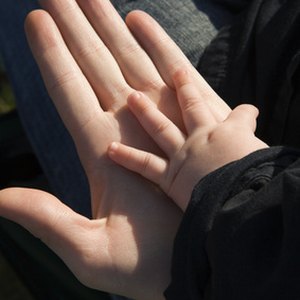
Child support is a recurring monthly payment a noncustodial parent pays the custodial parent. The purpose of child support is to make sure the noncustodial parent is also financially responsible for the child and to prevent the custodial parent from bearing all the costs associated with providing food, shelter, clothing and other care for the child. If, however, a noncustodial parent regularly cares for the child, or the parents have joint custody of the child, the amount paid in child support will be reduced to reflect parenting time.
Types of Custody
There are two types of custody: physical custody and legal custody. In most situations, both parents always have joint legal custody of a minor child, regardless of the physical custody arrangement. Legal custody refers to the ability to make decisions concerning the health, welfare and education of the child. Physical custody, on the other hand, refers to which parent primarily raises the child and is the parent the child primarily resides with. Sharing joint legal custody will not affect child support. Physical custody can, however, determine or reduce child support payments, depending on the situation.
Determining Custody
Indiana courts encourage joint custody whenever possible, although one parent typically has primary custody (the "custodial" parent) and the other parent has regular visitation with the child (the "noncustodial" parent). In determining whether parents should have joint custody or which parent should be the primary caretaker of the child, Indiana courts focus on the best interest of the child. In Indiana, there is no presumption that one parent is a better fit. When considering the child's best interest, courts look at the age and sex of the child; the wishes of the parents; the wishes of the child if he is over 14; the past relationship the child had with each parent; the child's relationship with his community, siblings and other family members; the health of the child and each parent; and any past history of physical, emotional or substance abuse by the parents.
Effects of Joint Custody
When each parent has the child 50 percent of the time and the parents have similar incomes and finances, it is possible that neither parent will have to pay child support. In these cases, the parents will have to coordinate between them how to cover the costs, such as splitting tuition, medical bills and other expenses. Such couples should be mindful, though, that even if the child spends an equal amount of time with both parents, a parent with substantially more financial resources than the other may still be ordered to pay child support.
Other Considerations
In most child custody situations, the noncustodial parent has the child for one weeknight and two weekends per month. When the noncustodial parent frequently has the child, however, even if not in a straight 50/50 split or joint custody situation, child support may be reduced to reflect parenting time, particularly if it's close to 50/50 such as 40/60 or even 30/70. The child support award can be reduced to reflect the costs the noncustodial parent pays during his parenting time.
References
- Indiana Rules of Court: Child Support Rules and Guidelines
- ABA: What Happens When Parents Share Custody?
- DivorceSource: Indiana: State Divorce Laws
- USDA. "The Cost of Raising a Child." Accessed January 28, 2020.
- Office of Child Support Enforcement. "Who Owes the Child Support Debt?" Accessed January 28, 2020.
Writer Bio
Lindsay Nixon has been writing since 2007. Her work has appeared in "Vegetarian Times," "Women's Health Magazine" and online for The Huffington Post. She is also a published author, lawyer and certified personal trainer. Nixon has two Bachelors of Arts in classics and communications from the College of Charleston and a Juris Doctor from the New England School of Law.

